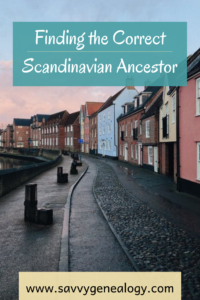Finding the Correct Scandinavian Ancestor

This is a big question and one that’s common among the genealogy world. This culture is particularly tough because of it’s naming practices. It’s hard to keep the similar names straight when you are going from one generation to another. So how DO you know if you have the correct Scandinavian ancestor? Here are a few of my tips that help me find the correct ancestor.
Correct Scandinavian Ancestor Tip 1
You must remember that most Scandinavians attached a place name behind their surname or instead of their surname. This is key when finding the correct person. For example, if you have a Jens Nielsen that you’re searching for and you do a general search, then you may bring up twenty Jens Nielsens. However, if they have their birthplace or farm name behind their name, such as Jens Nielsen Ost, then it becomes easier to narrow the search until you find your ancestor. This is especially helpful when you know where your ancestor lived or was born. Of course, there are exceptions to this rule, but in most cases, having a place name helps you find your correct ancestor.
Tip 2
In order to find your correct Scandinavian ancestor, you need to know your ancestor’s dates and places of residence if you can. There is usually another genealogy record that has your ancestor’s birthplace or last residence that will help you find the correct ancestor. Therefore, when you do more Scandinavian searches you can have the general place where they came from to help narrow the search. In addition, if you have their birth year or their immigration year,etc. then this can also narrow that search to your ancestor.

For example, let’s say your ancestor was born in 1834 in Vikedal, Norway. If you do a search and find a person with the same name born in the same place but the wrong birth year, then they’re not the same person. This works for being born the same year, but in two different places in Norway. This simple example illustrates my point about keeping your ancestor’s age in mind as you find new records. Was he old enough to serve in the military? Was she a servant in another household during the census years or was she possibly married by then?
Tip 3
Does it make sense? This is one of my biggest tools. Is it reasonable according to family and individual life patterns that this ancestor could have done this event? Let’s say you find your ancestor on a 1900 census in southern Norway living with a spouse and children. Then you find the same name on a marriage record two years later in northern Norway. Is that the same person? Could be. I usually ask, do they have the same place name behind the surname? Is there a birthplace listed? Does it say widow next to your ancestor’s name? Can that ancestor realistically make the journey from southern Norway to northern Norway within those two years? Can they have their first spouse die, then make the trek, then find a new husband and get married during that time? In my mind, that’s pushing it!
I found one of my ancestors on the 1891 Norway census living as a servant in another family’s home when she was eighteen years old. I then found a death record for her in northern Norway stating that she had died five years after 1891. It didn’t list if she had ever married or had children. I had to ask does this make sense? She could have traveled to northern Norway in five years.

However, I knew that her other family patterns were not like that. Her other family members liked to stay local and marry local and live local. This didn’t fit the pattern of the rest of her family. Another thing was that she was a woman in the 1800s. Could she logically travel that far assuming that she wasn’t married yet? If she lived in our day, then we would say yes to this question. However, it was a lot more difficult back then to travel by herself. I concluded that this wasn’t the same ancestor even though the name was exactly the same. Later, I found another document that said the northern Norway ancestor was born in a different birthplace then my ancestor.
Conclusion for Finding Your Correct Ancestor
Finding your correct Scandinavian ancestor is a work in progress. Even the professionals make mistakes in this area from time to time. Going down the wrong path because you thought they were your correct ancestor happens to all of us genealogists! It just means that next time make sure all of the dates, places, and names are in front of you so you can cross reference them as you research. And make sure your analyzing makes sense for the time period, gender, and age of the person.
Good luck and happy hunting!
Tiffany
P.S. Have you signed up for your free download of the genealogy websites that I use in my business? Do you want to learn more about Scandinavian naming patterns? Go here. FamilySearch.org has more information here about naming patterns.
ancestor, correct ancestor, dates, names, place names, places, residence






Alisha
Very useful information even if one is looking at American ancestors. Thanks!